How to Get a Federal Firearms License: An Overview
Posted by Mandu Moses on Dec 1st 2023
Gun control is one of the most polarizing issues in the United States. Proponents of stricter gun laws point to a lack of safety in a country where almost 88 in 100 people own guns. Opponents of gun regulations also fear a loss of safety and argue that compromising individual right to bear arms could leave them vulnerable.
The perpetual debate between both sides of the gun control argument isn't going away any time soon. Whether it is increased oversight or reduced barriers to gun access, US policymakers continue to grapple with firearms regulations, with the endgame of striking a balance between individual rights and public safety.
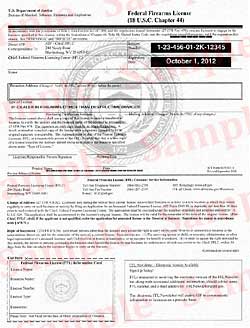
Though regulations vary from state to state, the Federal Firearms Licensing (FFL) is a crucial regulatory framework that governs the manufacturing, retail, and ownership of firearms at the federal level. This post provides an overview of FFL’s regulatory criteria, eligibility requirements for legal trade and possession of firearms, and the application process.
What Is The Federal Firearms License?
Legal firearm possession is enshrined in the Second Amendment of the US Constitution. While it guarantees citizens the right to bear arms, the right is not absolute and is subject to various federal, state, and local laws. That is where the FFL system comes into play.
The Federal Firearms Licensing (FFL) is a legal authorization that permits entities to manufacture, import, and sell firearms and ammunition within the United States. It was established and signed into Law by Lyndon B. Johnson under the Gun Control Act 1968.
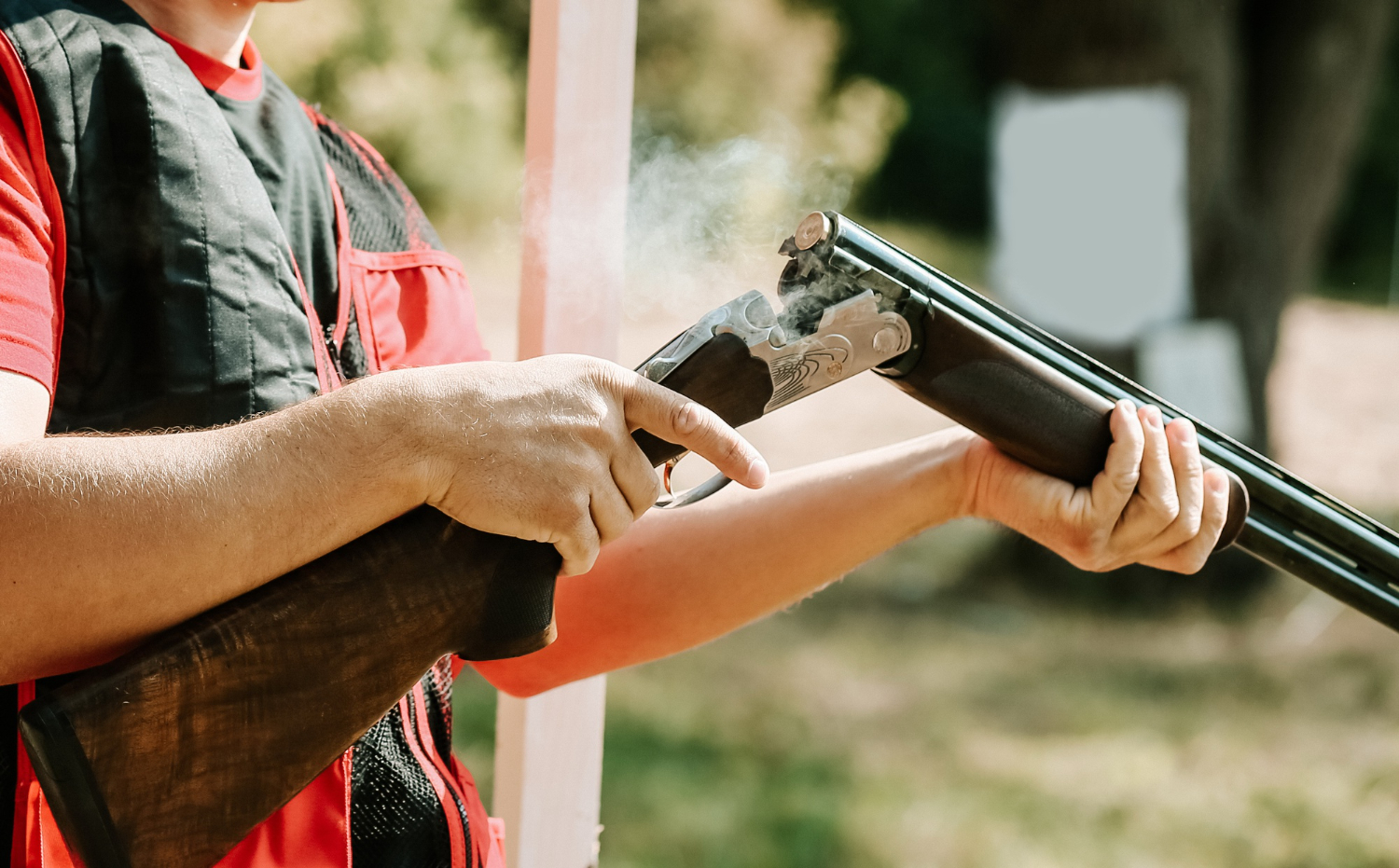
Image by freepic.diller
Licensing is issued by the Bureau of Alcohol, Tobacco, Firearms, and Explosives (ATF), which oversees compliance to ensure that only qualified entities and individuals engage in legal trade or possess certain firearms.
The license itself is one page long and bears an ATF seal watermark, as well as key information such as license number, type, expiration date, and purpose specification. In many states, acquiring one will entail completing an application through a local police department, providing fingerprints, completing a firearms safety course, and undergoing a thorough background check.
The primary objectives of the FFL are to prevent people with a track record of violence, those at risk of self-harm or future violence, and illegal firearm traffickers from obtaining guns. The ATF – embedded within the US Department of Justice – issues and regulates licenses to ensure responsible ownership and public safety.
Functions of the FFL Framework
As a regulatory framework, the Federal Firearms Licensing system serves several critical mandates. These include:
- Regulating the legal trade of firearms and ammunition by issuing licenses to qualified individuals and entities, ensuring compliance with federal laws and regulations.
- Conducting thorough background checks and vetting procedures to prevent individuals with criminal records or mental health issues from obtaining firearms licenses.
- Upholding public safety by imposing strict regulations and standards on FFL holders, thereby minimizing the risk of firearms falling into the hands of unauthorized or potentially dangerous individuals.
- Maintaining detailed records of firearm transactions, facilitating the tracing of firearms used in criminal activities, and aiding law enforcement in investigations.
- Monitoring and controlling the interstate and international transfer of firearms to prevent illegal trafficking and ensure the proper documentation of imports and exports.
Types of Federal Firearms Licenses
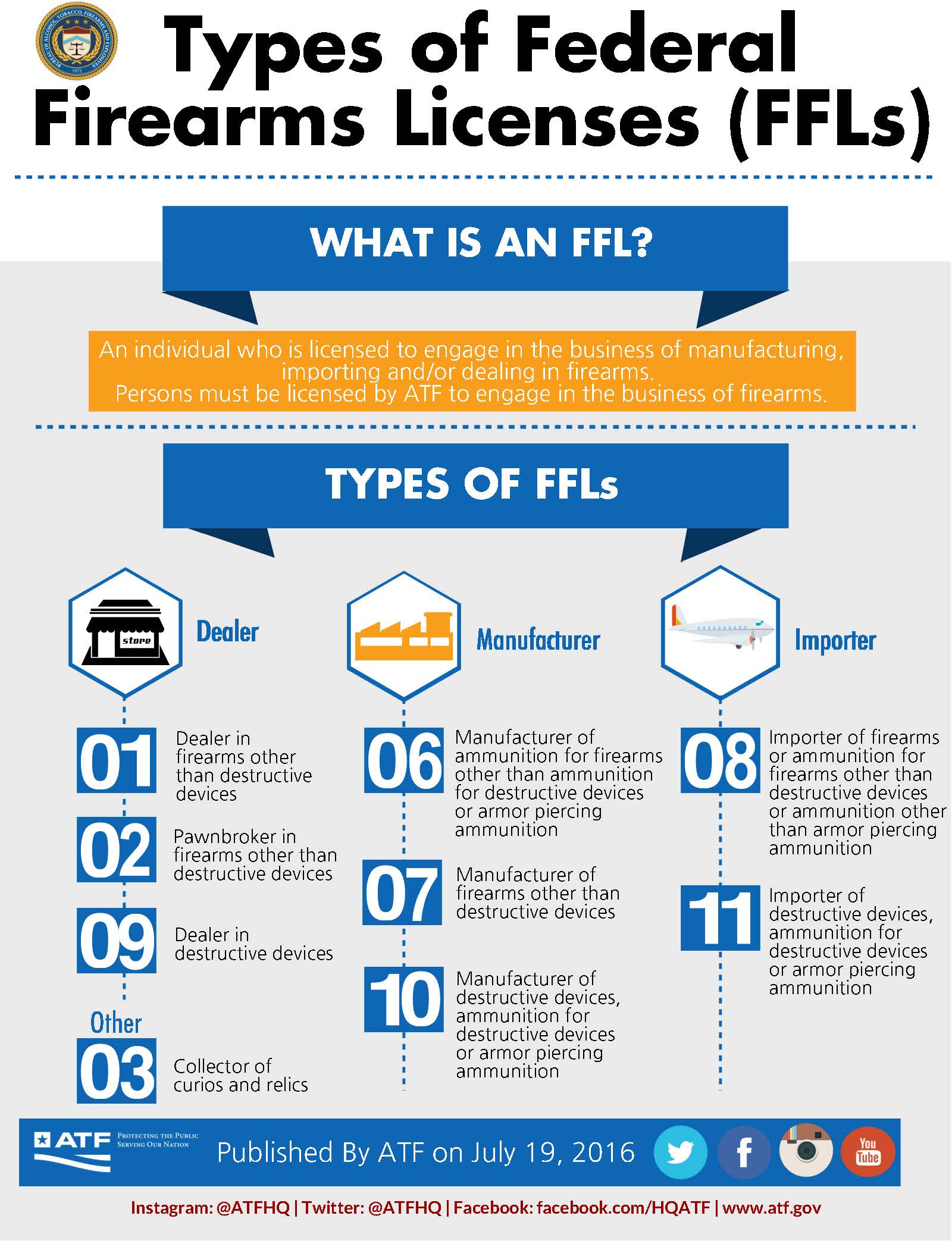
Image Courtesy: ATF.GOV
There are eleven types of Federal Firearms Licenses issued by the ATF in the United States. Each one permits individuals and entities to pursue a range of firearms or ammunition-related manufacturing and retail. Below are the primary categories of FFLs and their corresponding activities:
- Type 01 (Dealer or Gunsmith License): This license permits people or companies to buy, sell, or repair firearms. It also covers the sale or purchase of firearms to and from other licensed dealers, and the general public.
- Type 02 (Pawnbroker License): This license enables pawnshops to receive and sell weapons as part of their loan business.
- Type 03 (Collector of Curios and Relics License): The license is designed for those who collect weapons classified as curios or relics. However, it does not permit resale.
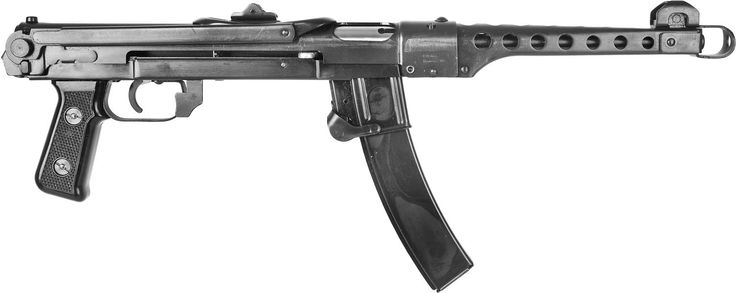
Image By Zack Bevins
- Type 06 (Manufacturer of Ammunition): The license is for entities that manufacture firearms and ammunition, including the assembly and fabricating of ammunition components.
- Type 07 (Manufacturer of Firearms): This license applies to individuals or entities involved in the manufacturing of firearms. It covers the commercial production of firearms, including the assembly of parts and gun-smithing.
- Type 08 (Importer License): With this license, businesses are allowed to import firearms and ammo into the United States for commercial reasons. However, it is subject to strict compliance and import restrictions.
- Type 09 (Dealer in Destructive Devices): This license is for individuals and organizations that deal with destructive explosive devices such as grenades, as well as larger caliber firearms with a bore diameter of more than 0.5 inches.
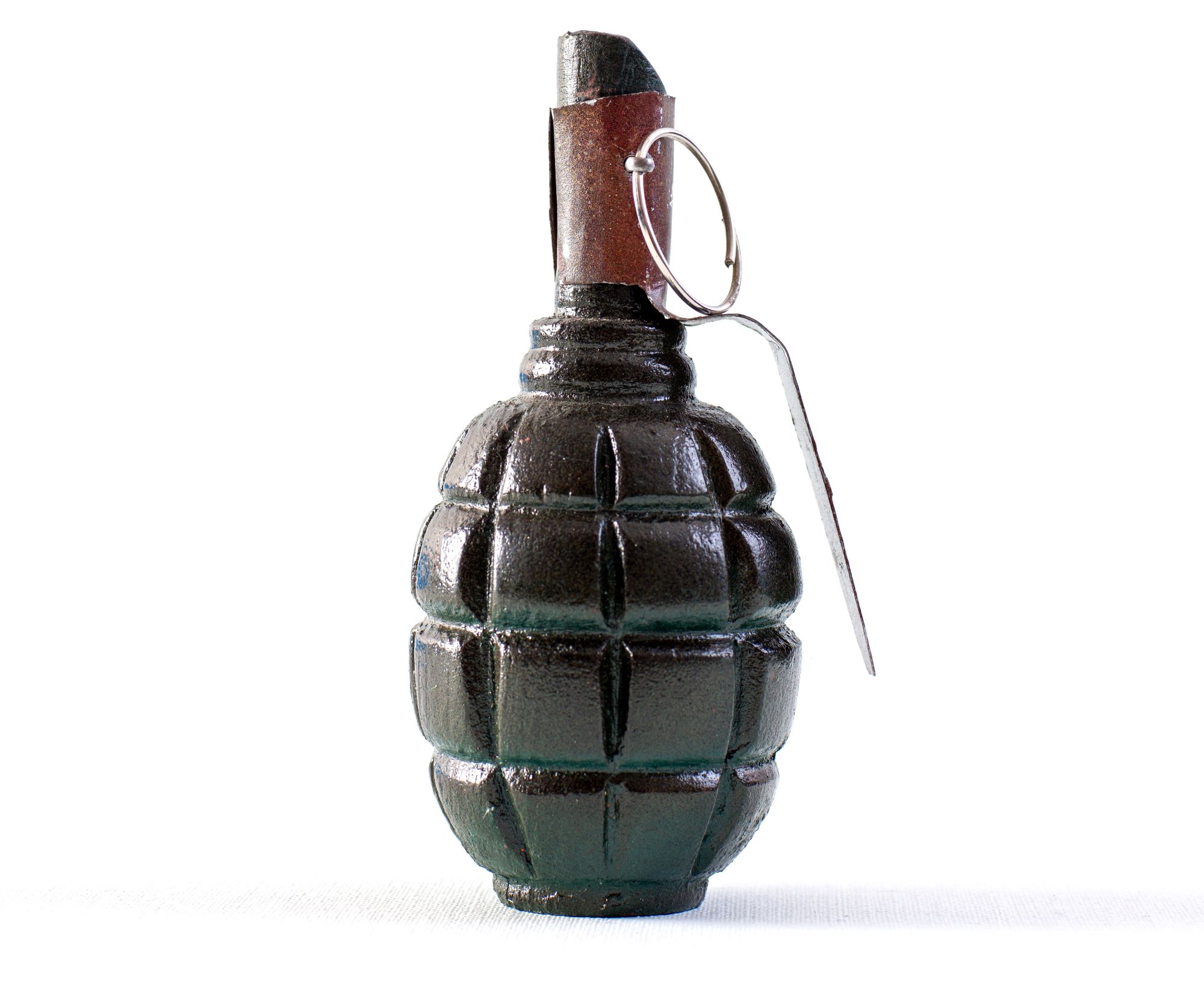
Image by mdjaff
- Type 10 (Manufacturer of Destructive Devices): The license allows entities to manufacture explosives and a wide range of destructive devices.
- Type 11 (Importer of Destructive Devices): This license permits individuals and entities to import destructive devices for resale, subject to ATF guidelines and federal law.
What Is ATF’s Criteria For Federal Firearms License?
Firearm licensing requires that an individual or organization qualify for and obtain a license before ownership. The Bureau of Alcohol, Tobacco, Firearms, and Explosives (ATF) has established specific qualifying standard criteria that all applicants must meet to obtain a Federal Firearms License (FFL). To qualify, one must meet the following requirements:
- Age Requirement: The applicant must be 21 years or older to be eligible for an FFL. However, you can apply for a Type 03 (Collector’s License) at 18 years.
- Citizenship: The applicant should strictly be a citizen of the United States, or show proof of legal permanent residence.
- Legal Business Premises: The applicant must have a business location that satisfies ATF specifications regarding the type of license being applied.
- Compliance with Local and State Laws: The applicant must comply with all local and state laws relating to firearms and ammunition.
- Zero Prohibitions & Convictions: The applicant must have no outstanding prohibitions about shipping, receiving, and possessing firearms and ammunition as stipulated under the Gun Control Act. Individuals with a record of specific crimes, restraining orders, mental health issues, and a host of other disqualifying factors make you ineligible.
- Background Checks: The entity, organization, or individual applying; along with their employees – must undergo thorough background checks and have their personal information verified with the ATF.
Application Summary For Obtaining A FFL
The process of acquiring a firearm license in the US is much like obtaining a driver’s license. While it is admittedly extensive, licensing laws vary in terms of the type of firearms that require a license to purchase or acquire. Firearm licensing laws generally require that you:
- Apply in person.
- Submit personal information, including fingerprints and contact, directly to local law enforcement.
- Complete a firearms training safety course.
- Wait for the ATF to conduct background checks before you acquire a license.
Federal Firearms License Application Process
At the federal level, the application process is pretty standard. Below is a step-by-step guide that anyone who wishes to obtain a gun should follow:
- Complete ATF Forms: The buyer is required to fill out a Firearms Transaction Record form. Download the FFL application package (also called ATF Form 7) and complete all fields that cover your identity and background. Ensure you choose an FFL type that corresponds to your activities.
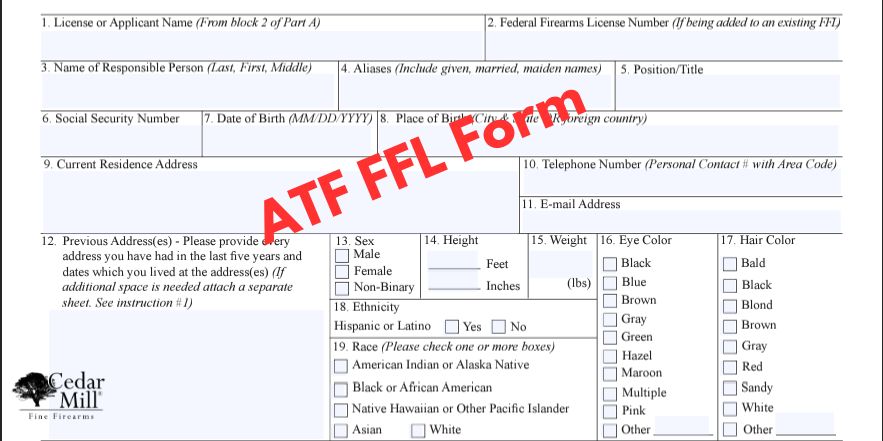
- Regulatory Compliance: Ensure you abide by all the local, state, and federal laws and regulations that relate to firearms trade and ownership.
- Photographs and Fingerprint Cards: As part of the application process, you must provide fingerprint data and passport-sized photos.
- Background Checks: At this point, the ATF, through the National Instant Criminal Background Check System (NICS) will investigate an applicant’s eligibility by looking at their criminal history, mental health issues, and other factors that could disqualify them.
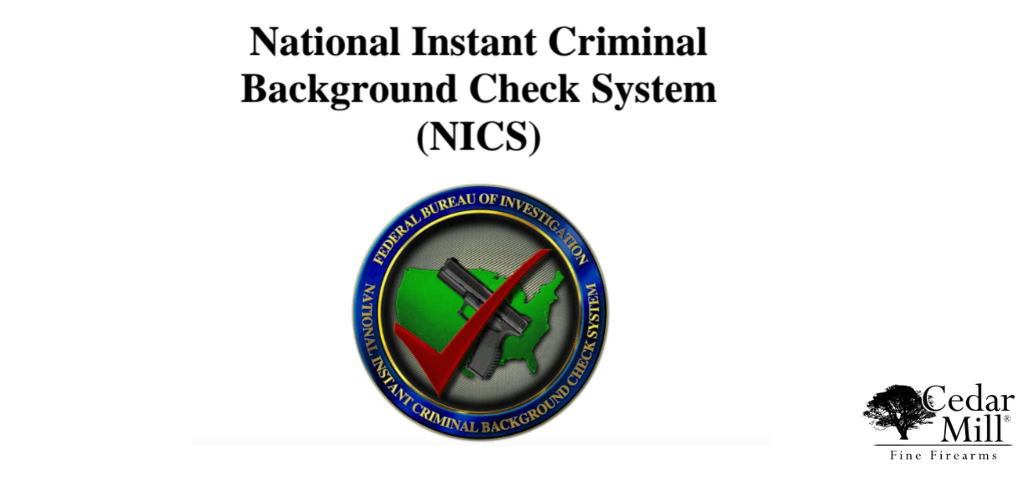
- ATF Interview: The ATF may schedule an interview to inquire about certain policies in the company.
- Payment: Every FFL has its corresponding cost, which can range from $30 to $3,000 per 3 years.
- Waiting Period: A waiting period, which varies from state to state, is allocated to allow the ATF ample time to complete the necessary checks and verification. The waiting period is usually approximately 60 days.
- Approval and Transfer: If a buyer’s background check comes back clear, the buyer receives the FFL in the mail at the end of the waiting period.
- Additional Permits or Requirements: Note that some states and local jurisdictions require additional certifications that must be met after the purchase.
- Renewal: Every FFL is subject to renewal annually, so ensure that you submit a renewal application before the deadline.
Individuals Restricted From Purchasing Or Possessing Firearms
Federal law blocks the sale of firearms to certain individuals who are deemed to be a danger to society. These categories of people include:
- Fugitives.
- People with felony convictions that include more than a year of prison sentence.
- Patients involuntarily committed to mental institutions.
- Those guilty of unlawful possession of controlled substances within the past year.
- Folks with court-ordered restraining orders.
- Unauthorized immigrants.
- Military personnel who have been dishonorably discharged from duty.
Conclusion
The Federal Firearms Licensing framework is the regulatory system of the firearms industry that ensures public safety. It is administered by the ATF and provides strict licensing requirements that facilitate firearm tracing and lawful transfer. As a result, the FFL prevents illegal firearm trafficking and promotes responsible gun possession.
